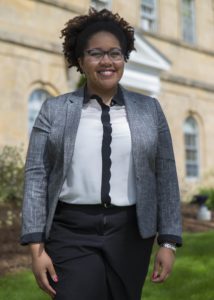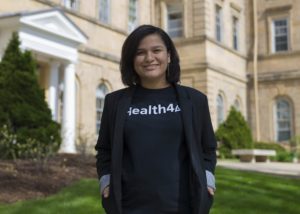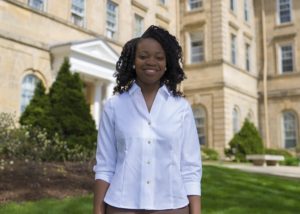Although their specific research agendas differ, Regina Fuller (Educational Policy Studies), Amy Jones (Sociology), and Josefina Flores Morales (Sociology) share a commitment to doing scholarship that impacts health and well-being for communities across the globe. In 2016, these UW–Madison graduate students became part of the inaugural, nationwide cohort of Health Policy Research Scholars (HPRS) supported by the Robert Wood Johnson Foundation (RWJF)—the United States’ largest philanthropic organization dedicated solely to health. As scholars, the three doctoral students benefit from the program’s leadership development, funding (e.g. $30,000 stipend every year for four years), and networking opportunities.
Fuller, Jones, and Flores Morales were three of 40 scholars selected from over 20 universities for the program. According to HPRS’s website, the program offers first- and second-year full-time doctoral students, from underrepresented populations and/or disadvantaged backgrounds, the opportunity to “receive training in health policy translation, dissemination, communication, health equity, and population health,” and to develop their leadership skills. The HPRS program prepares scholars to leverage their research in ways that shape health policy. Another central goal of the program is to advocate for policies and solutions that are inclusive, and most importantly, build what the RWJF calls a “Culture of Health,” in which health is a valued priority shaped by many stakeholders across academic disciplines.
In contributing to this culture, these three students each pursue research agendas that focus on different under-represented or marginalized communities. Amy Jones (Bachelor of Arts, Yale University, 2009) a doctoral student in sociology specializing in ethnography and conversation analysis, focuses her research on the experience of race and class in college. Her current project examines how overall health and wellness for African-American students is shaped by prevalent beliefs about the benefits of diversity in American higher education. She considers how narratives about diversity often can turn into unintended real-life negative experiences for African-Americans, which hinder their college-going experiences.

For Jones, who was attracted to UW–Madison’s highly ranked sociology program with “its well-rounded preparation in qualitative and quantitative methods,” the HPRS program is a unique opportunity to establish connections with students from similar backgrounds and communities. In this way, the HPRS cohort itself is a support system for students.
“As a person of color, the program has helped me build relationships with students who share similar experiences, or have encountered similar challenges during their graduate work.” —Amy Jones

Presently, she is curious about how undocumented immigrants negotiate their employment and future plans as well as how their long-term employment in low-wage jobs influences their mental and physical health in the short- and long-term. In her doctoral program, she will gain quantitative skills in demography as well as qualitative skills in ethnographic methods in order to be able to reveal the nuanced narratives of adult immigrant workers with mixed-methods. Her research in both health and education hold great implications for health policy at the local and national level.
Specializing in demography and population studies, Josefina Flores Morales (Bachelor of Arts, UCLA, 2016) is also a doctoral student in sociology. She studies the education of migrant children, and the effects that this education has on long-term employment. And as a scholar, she sees a need for more research on the links between education, employment, and health. “I am interested in the health implications and consequences of certain employment and labor conditions, especially for marginalized populations,” Flores Morales explained.
Reflecting on the benefits of the HPRS program, she claimed that, “one of the biggest strengths of the program is the indirect benefit of knowing 40 other people who are in Ph.D. programs across fields.” Meeting other scholars with a common health focus will “be huge in the long run,” Flores Morales noted. She also sees the HPRS program as important for learning how to do research that can have policy implications. “The program offers training about how to tie our research to policy and to real communities, and that is very important in these political times.” In the future, she would like to work as a researcher in demography—ideally in California.

As a doctoral student in the comparative and international education concentration within the Department of Educational Policy Studies – Regina Fuller studies adult education and literacy in post-conflict settings as well as adolescent sexual and reproductive health education in sub-Saharan Africa. After obtaining a Bachelor of Arts from Wofford College in 2011 and a Master of Arts in African Studies from the University of Ghana Legon, Fuller decided to enroll at UW–Madison.
The Educational Policy Studies program offers her “a disciplinary foundation in anthropology of education, while also providing her the freedom to pursue other coursework outside of the School of Education.” She sees HPRS as valuable for meeting scholars from other disciplines, which has helped her “think about my research topic of adolescent sexual health from other disciplinary perspectives.” After completing her doctoral studies, Fuller would like to pursue a career where she can continue researching adolescent reproductive health in ways that impact policy. In the future, she plans to work as a faculty member, a think-tank researcher, or at the U.S. Department of Education.
For these graduate students, HPRS provides support for their academic research and scholarly identities, prepares them to work across disciplinary boundaries, and connects them to others who have a desire to cultivate a Culture of Health through research and policy. Each year, the Robert Wood Johnson Foundation will select about 50 new Health Policy Research Scholars from across the United States. To learn more about the program and to apply, visit http://healthpolicyresearch-scholars.org/about-the-program/.
Written by Mike Haen